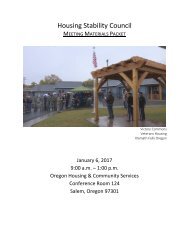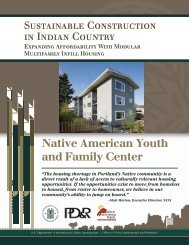You also want an ePaper? Increase the reach of your titles
YUMPU automatically turns print PDFs into web optimized ePapers that Google loves.
December 16, 2016<br />
2017 Mental Health <strong>Housing</strong> NOFA<br />
Page 2 of 4<br />
recommendations are modestly different. I have noted where OHCS’ recommendation differs from the<br />
OHA recommendations and included an explanation below.<br />
NOFA Options:<br />
Feedback from all stakeholders, including OHA and OHCS, indicated that the Mental Health <strong>Housing</strong><br />
NOFA that was issued this past June was too limiting for applicants as it did not include the ability to<br />
apply for additional funding from OHCS. Allowing a variety of funding combination option would<br />
allow applicants to tailor their applications to the specific financial needs of the proposed project.<br />
The consensus recommendations are to:<br />
<br />
<br />
Issue a standalone Mental Health <strong>Housing</strong> NOFA that allows applicants to pair Mental Health<br />
<strong>Housing</strong> funds with 9% LIHTCs and other gap funds, with 4% LIHTCs, or without other OHCS<br />
funds. Applicants under the Mental Health <strong>Housing</strong> NOFA would indicate if they are<br />
concurrently applying for any other OHCS resources.<br />
Streamline and clarify the NOFA application, where possible.<br />
These recommendations will lead to fewer barriers and stronger applicant participation.<br />
Crisis Respite:<br />
Stakeholder feedback indicated the Crisis Respite application did not fit well within the context of a<br />
typical affordable housing application, as Crisis Respite is very different from a permanent housing<br />
solution. Many of the typical affordable housing application criteria were confusing and made it<br />
difficult to clearly articulate the proposed project.<br />
The consensus recommendations are to:<br />
<br />
<br />
Create a specific application for Crisis Respite within the larger Mental Health <strong>Housing</strong> NOFA<br />
that addresses differences in the housing type and make them easier to participate as well as<br />
review. This would include removal of rental rate language and affordability requirements<br />
associated with permanent housing, and focusing on appropriate level of stay and temporary<br />
housing revenue models.<br />
OHA received stakeholder feedback on their definition of maximum stay, which as stated in the<br />
previous NOFA is 30 days with the ability to extend if it is determined a longer stay is clinically<br />
necessary. OHA is refining its recommendation to OHCS regarding the appropriate length of<br />
stay. We anticipate having this information by the end of the year and will include it in the<br />
NOFA application.<br />
Funding Allocations:<br />
Stakeholder feedback indicated the allocations for funding between the various types of housing and<br />
geographic location were confusing to applicants and did little to entice applicants to apply for funding.<br />
OHCS staff recommendation for allocating the remaining $16,238,421 in Mental Health <strong>Housing</strong> Funds<br />
is as follows:<br />
Page 28




